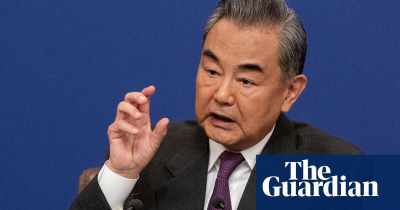The Guardian-China pledges to deepen Russia ties and criticises US obsession with suppressing Beijing
March 7, 2024 3 min 611 words
这篇报道突显了中国外交部长王毅在“两会”上的讲话,指责美国试图打压中国,并誓言加深与俄罗斯的关系。王毅谴责美国对中国公司实施“令人费解”和“难以理解”的制裁,同时强调中国坚决反对“单边主义和保护主义”。报道中指出,王毅认为中美关系“关键”,但重点将在未来几个月加强中俄关系。他赞扬习近平和普京的“战略引导”,强调双边贸易创下去年2400亿美元的纪录。王毅的言辞表达了对美国未履行承诺的不满,并称其“痴迷”于打压中国。在强调相互尊重的重要性时,他表示“某些国家坐在桌上而另一些国家却成为菜单是不可接受的”。报道反映了中俄在经济、能源和外交上的密切合作,以及中国强调“多极化”世界秩序的趋势。这一立场在中国与俄罗斯于2022年2月宣布的“无限制”友谊中占据重要地位。
China’s top foreign affairs official has accused the US of trying to suppress China and has vowed to deepen relations with Russia, as Beijing continues to assert the importance of what it calls a “multipolar” world order.
Foreign minister Wang Yi accused the US of imposing sanctions on Chinese companies to a “bewildering” and “unfathomable” level, referencing Beijing’s opposition to “unilateralism and protectionism”, complaints that have become buzzwords in China’s official statements of late.
Speaking on Thursday, Wang said the relationship between China and the US was “critical” but that it was the relationship with Russia that would be deepened and strengthened in the coming months.
Wang praised the “strategic guidance” of China’s President Xi Jinping and Russia’s Vladimir Putin for strengthening the relationship to the point that bilateral trade hit a record $240bn last year. Wang noted that Russian natural gas was fuelling Chinese households, while Chinese cars were driving on Russian roads.
Russia’s gas exports to China have surged since the start of the war in Ukraine, helping it withstand the economic pain caused by falling shipments to Europe because of sanctions.
China sold more than 841,000 vehicles to Russia last year, making it the top export market for China’s carmakers. Overall exports to Russia increased 54% compared with 2022.
Meanwhile, Wang accused the US of failing to fulfil promises and said it was “obsessed” with suppressing China.
Wang stressed the importance of mutual respect. “It is unacceptable that certain countries are at the table while others are on the menu,” he said.
Relations between the US and China have thawed slightly since Xi met President Joe Biden in November. Wang noted that Biden had promised not to back Taiwanese independence, and added that countries that did so would be “burned for playing with fire”.
Taiwan is a self-governing island that China claims as part of its territory. In January, voters in Taiwan elected Lai Ching-te from the pro-sovereignty Democratic Progressive party as president, to Beijing’s anger.
In his annual press conference, Wang discussed the conflicts in Ukraine and Gaza, as well as China’s relationship with Europe. Throughout, he emphasised the “trend” towards a multipolar world, one that Beijing says is no longer dominated by Washington hegemony.
This has been an important part of the “no limits” friendship that China and Russia declared in February 2022, shortly before Russia’s invasion of Ukraine. Beijing has supported Moscow diplomatically and economically since the invasion, to the frustration of western leaders. “The China-Russia relationship moves ahead along the trend of multipolarity,” Wang said on Thursday.
As part of this emphasis on multipolarity, China’s foreign policy increasingly focuses the importance of the global south. Wang said China “is, was, and will be a crucial member of” that group of countries.
“The global south is no longer the silent majority, but the force for reforming the international order”.
Wang was speaking on the sidelines of the Two Sessions, China’s annual parliamentary and political advisory meetings. The rubber-stamp parliament, the National People’s Congress, is the forum in which new government appointments are announced.
Observers had expected a new foreign minister to be revealed, as Wang had been seen as a temporary stopgap since his predecessor, Qin Gang mysteriously fell from grace and was fired last year. But the agenda for this year’s meetings did not include any mention of personnel changes.
Wang is also director of the Chinese Communist party’s foreign affairs commission, a position that holds more power than foreign minister.

